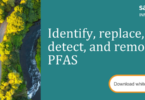The water industry plays a vital role in providing essential services to households and businesses worldwide, yet with the rising cost of living and increasing financial pressures on customers, challenges arise with ensuring that vulnerable customers are receiving the support they need. In response to this, Ofwat, the UK water industry regulator in England and Wales has set new rules outlining clear minimum standards for water companies to ensure water companies protect vulnerable customers, ensuring their human right to access water is upheld.
The Vulnerability in the Water Sector
Ofwat’s new vulnerability guide recognises that some customers, such as those who are unwell, have disabilities, or face mental health issues, may require additional assistance to access water and wastewater services. The guidance from Ofwat aims to promote inclusivity and develop services that are designed to meet the needs of all water customers.
The key components of Ofwat’s vulnerability guidance include the following:
- Providing a high standard of service and support for vulnerable customers
- Developing services that are inclusive by design
- Identifying customers who need extra help
- Developing and implementing vulnerability strategies
- Recording people’s needs
These guidelines have been developed following a consultation period where Ofwat received valuable input from more than 30 organisations (including Scope, Age UK, and Mencap) that emphasized how important it is to provide support to vulnerable customers.
Fostering a Customer-Centric Approach
In addition to its vulnerability guidance, Ofwat is also planning to introduce a new customer-focused licence early this year. This condition aims to encourage water companies to prioritise high standards of customer support/service while taking into account vulnerability guidance when assessing compliance. By placing a stronger emphasis on customer needs, Ofwat hopes to ensure that water companies will proactively address the challenges faced by vulnerable customers.
Lynn Parker, senior director for casework, customers, and enforcement at Ofwat, calls on the importance of improving the service provided to vulnerable customers. She said:
“With customer bills likely to rise, it is vital that companies redouble their efforts to improve the service they offer, especially to those who are most vulnerable. This new guidance makes clear the level of support we expect all companies to provide to customers who may need extra help for whatever reason. If they do not do so, we will take action and hold them to account.”
What Impact Does the Cost of Living Have On Water Bill Payers
To gain a broad understanding of the financial challenges faced by water bill payers in England and Wales, Ofwat has also released its latest ‘Cost of Living’ report. This report sheds light on the experiences of individuals and households when it comes to paying their water bills.
According to the report, 50% of billpayers have struggled fairly frequently with household bills over the past year. This percentage increases to 65% among individuals with long-term illnesses, disabilities, or health conditions. In addition to these figures, sadly only 7% of water bill payers have reported receiving financial support. Many people have also come forward to admit that the financial issues towards paying their water bills have negatively affected their mental health, and only 15% of those who reported struggling ‘all the time’ with household bills had received help with their water bills.
The Ofwat report highlights the widespread impact of the cost of living crisis and the need for increased awareness of available support options for customers.
To address this issue, Ofwat encourages individuals experiencing difficulties in paying their water bills to speak up and reach out to their water company. By contacting their company, customers can explore possible schemes that may help reduce bills, facilitate smoother payment plans, or provide assistance with debt management during difficult times.
Support Options for Vulnerable Customers
While the energy industry has received significant attention in recent months due to rising energy costs and government price caps, the water industry has not received nearly as much media coverage regarding its efforts to support vulnerable customers. Although various support schemes do exist within the water industry, often they are fragmented, leading to customer confusion and inefficiency when customers seek help.
Customers may encounter a range of support options depending on their water supplier, requiring them to navigate multiple application processes. This can further complicate customers if they have separate suppliers for water and wastewater services or if they change their water supplier due to relocating. As a result, support levels vary depending on the location, allowing water suppliers to set their own eligibility criteria.
To address these challenges, there is a need for a unified and simplified approach to support vulnerable customers in the water industry. While Ofwat’s vulnerability guidance and the consideration of a single social tariff have seen some progress, immediate action is necessary to address the cost-of-living crisis.
Optimising the Power of Data in the Water Industry
One way to address the complexity of supporting vulnerable customers in the water industry is through the effective use of data.
Sagacity Solutions, along with Southern Water UK, and a consortium of industry experts, has used Ofwat’s £200 million Innovation Fund to develop a proof of concept called Water4All. This proposed data-driven solution would proactively offer help to vulnerable and struggling customers. By analysing customer data, the project showed, it is possible to identify financially vulnerable individuals who may not be aware of all the benefits they are eligible for. For example, the Water4All consortium found that more than one-fifth of financially distressed pensioners are not claiming the benefits that are available to them. This just highlights one need for improved data management and analysis to identify and assist those in need.
Beyond Water4All, Sagacity works with a number of water companies including Southern Water and Thames Water. Sagacity helps suppliers to meet regulatory obligations, identify financially vulnerable customers, and reduce debt and revenue leakage. Anita Dougall, CEO and co-founder of Sagacity, and a go-getting woman in the water industry, shared her thoughts on Ofwat’s new rules and how water companies must invest in cleaning and enriching their data to effectively identify vulnerable customers.
“Ofwat’s new rules are a welcome change that shifts the onus onto suppliers to find vulnerable customers, rather than waiting for them to come forward. People are not always forthcoming when it comes to asking for help, so it’s important that those who need support are proactively approached. Often people don’t know what help is out there – whether that’s financial support or priority services registers for those with infants or medical conditions. For example, our research found that only 6% of UK billpayers have considered asking their supplier for help when struggling to pay their utilities bills.”
“However, the task is complex. Water companies have millions of customer records, so establishing who is occupying a property presents a huge data challenge. This is especially true for rentals, which are more likely to house vulnerable people. Going a step further to identify which customers need to be moved onto a social tariff is even more complex. Even where systems are in place for flagging accounts, people’s situations are fluid – today’s stable customer might face hardship tomorrow. Most water companies do not have the data maturity to handle this, which is understandable, as data is not their core business.”
“To meet Ofwat’s new rules, suppliers must clean and enrich their data to get a clear picture of who is living at a property. But this often requires a lot of data detective work. Firstly, they must clean up any ‘dirty data’ and ensure they have all the correct details for their customers. Next, they must go beyond their own books to enrich their data using third-party capabilities to highlight signs of occupancy and fill any gaps – for example, cross-checking electoral records, or even bank or phone account registrations. Finally, they must use analytics to match these records accurately, before creating a process for contacting and onboarding customers or assigning them to the right tariffs. It’s no mean feat and it will take time – and the clock is ticking, with the new rules set to come into force in early 2024, so water companies need to act now.”
How to Overcome Challenges & Embrace Change
While the water industry faces challenges in implementing effective support systems for vulnerable customers, organisations across the sector must work together to overcome these obstacles – we are one community and we must remember this! By learning from successful approaches in other industries like the energy sector, water companies can streamline their support processes and provide timely assistance to vulnerable customers and others in need.
For us to move in the right direction, policymakers, regulators, and water suppliers must collaborate to develop a unified approach that ensures consistent and comprehensive support to vulnerable customers. By resigning the current patchwork system in history, the water industry can demonstrate its commitment to providing reliable and inclusive services, irrespective of customers’ geographical location.
Summary
Ofwat’s new rules and vulnerability guidance represent a well-overdue positive step toward protecting vulnerable customers in the water industry.
By providing high standards of service and support, developing inclusive services, and harnessing the power of data (which we have access to!), water companies can proactively identify and support people in need.
We hope that with the combination of concerted efforts and collaboration, the water industry can ensure that vulnerable customers receive the necessary support regardless of their circumstances, promoting a fair and inclusive water sector for all.
Learn more at https://www.ofwat.gov.uk







